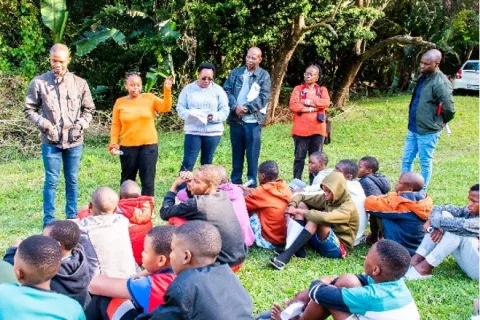Rebuilding social connections after lockdown is not as simple as we might think
News“Every person in the world has gone through some level of trauma, grief and loss during this time, and we need to be aware of that” – Nikki Bush, human potential and parenting expert
Many have longed for the freedom of movement and increased social activity that has come with Alert Level 1, but the realities of reintegrating and reconnecting is also highlighting many people’s fears. Children, parents, older people and even entire church congregations are finding the process of meeting together in public spaces again fraught with challenges.
On 14 October 2020 Heartlines hosted a webinar, “Reconnecting beyond lockdown”, which explored some practical things people can do to help ease into these transitions. Webinar host and TBN Channel Director Loyiso Bala opened by affirming that it has been a long time for us all to go without close connections to the people and communities we love.
Panellist Ps. Sipho Mahlangu, the lead pastor at UAFC HOPE to You in Soweto, emphasised the importance of listening to people to understand what their experiences during this difficult period have been. He said that when people feel heard, they feel safer and can more freely express some of their fears. Identifying fears is an important step in helping people work through them.
Human potential and parenting expert Nikki Bush reiterated the value of listening in the context of the home, especially as a way for parents to connect with their children and help them work through their fears too. She explained that children are going through different levels of trauma, fear and loss as a result of the pandemic and they don’t have the tools adults do to deal with it. “This has created a neediness in children, especially very young children who don’t yet have words to express themselves.”
Bush added that as the reality of COVID-19 is unlikely to abate for the foreseeable future, we need to find ways to continue living with it.
Family therapist, Merrishia Singh-Naicker also explored the permanence of some of the changes that have happened for people as a result of the pandemic. She added that in all contexts, but specifically in churches, leaders needed to be aware of the different ways that people’s lives have been changed. “We have all been affected, but people have been impacted differently…We need to listen. COVID-19 is bringing the art of listening front and centre and we really need to be listening to hear, not to respond.”
Why social connections matter
Mahlangu explained that as people were asked to retreat into their own “bubbles” at the start of lockdown, connections were broken and these needed to be reshaped and reformed going forward.
Lead pastor at Every Nation Rosebank, Simon Lerefolo, explored the significant social, spiritual and psychological importance of social connections, particularly in the context of corporate church gatherings. He cited research showing that there are physical benefits to people’s experiences of communal worship, including in chronic stress indicators.
People find church to be an important social space. Joanne Tatalias from St Martin’s-in-the-Veld Anglican church says that she has seen an increased need from congregants for time and space to socialise safely. People have been missing the social connections offered by church gatherings and her church has been looking at creative ways to help reconnect people.
Bala summarised many of the conversation’s themes when he said that parents and church leaders are having to fulfil multiple roles, including being creative problem solvers, analysing and guiding families and congregations into the brave new world of reconnecting after lockdown. What’s Your Story? has resources available to help families build deeper connections through story-sharing. Click here to find out more.
Featured
